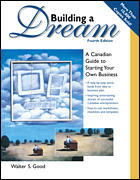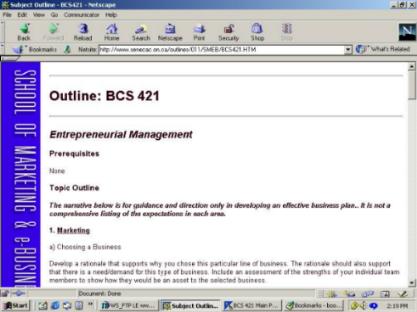
BCS 421
Prof. Tim Richardson During the
Jan - April 2002 term
 |
BCS 421 |
Prof. Tim Richardson During the Jan - April 2002 term |
|
January |
February |
March |
April |
| Jan 7th
Section TT Jan 9th
|
Handed out Official Course
Outlines, also available online at

discussed in class key points of the Official Learning Outcomes of the course 1. Define entrepreneurship
Also explained that a big part of this course is the personal awareness that you will obtain of your individual ability as an entrepreneur, and if you are so inclined, what things you might want to try. |
| Jan 10th
Section TT Jan 11th
|
Took time at the beginning
of the class to use probing questions to have students in the class suggest
many different words (nouns, adjectives and verbs) which could be used
in creating a definition of "what is an entrepreneur"
After a large list was put on the blackboard, the class was divided into groups and each group used their own combination of words to come up with a definition of "what is an entrepreneur". Groups that did well earned 3/3 marks |
|||||
| Jan 10th
Section TT Jan 11th
|
Terms associated with
being an Entrepreneur
|
|||||
| First Assignment | 1. find (online or offline)
2 sets of questions/lists of qualities to be an Entrepreneur
2. Go through the questions in the list and evaluate yourself 3. After scoring your evaluation, write down your strengths and weaknesses and compare this against the definition your group did in class 4. Bonus marks awarded if you co-operate with another student to obtain additional 2 sets of questions/lists of qualities to be an Entrepreneur and go through the questions in these lists and evaluate yourself 5. Hand in this assignment next class Section TT Jan 17th Section UU Jan 16th
|
| Jan 16th
Section UU Jan 17th
|
In class this week we had
a wide ranging discussion about:
Exploring Business Ideas: there are basically 2 ways you can go we then discussed among the class members the 2 ways
|
| Second Assignment | Exploring Business Ideas
Identify, with reasons and explanation, business ideas which would suit your personality and interests 1. Identify 4 different ideas in the category of "create your own" 2. Identify 3 different ideas in the category of "use somebody else's" List what each idea might
be.
Hand this in to the next
class
The purpose of this exercise is to force you to think about the range and variety of different entrepreneurial situations and apply how they would be relevant to your capabailities and interests. |
| Jan 23rd
Section UU 
Stage (Chpt) Six
|
In class this week we had
a wide ranging discussion about technical and market assessment.
We reviewed the points on page 125 re: a typical feasibility study and discussed what areas entrepreneurs are able to get good information, and in what areas there are weaknesses. We also discussed "Who is your customer" on page 127 in the text Page 129 notes Trade Publications. Using Trade Associations
is a great way to get market information.
|
| Third Assignment | This Assignment will be
"work" which will be credited towards the "Comprehensive Business Plan"
for this course.
Your task, is Read text page 123-148
Answer the questions from
the text on page 158
|
.
| Business
Plans Advice |
Many of the banks have business advice on their web site - see the screen capture below to go to the BMO page about Business Plan basics |